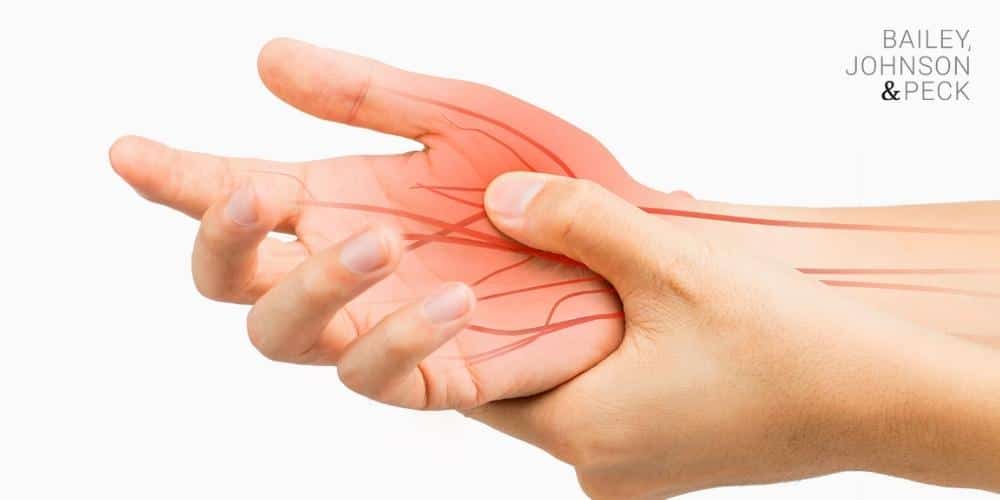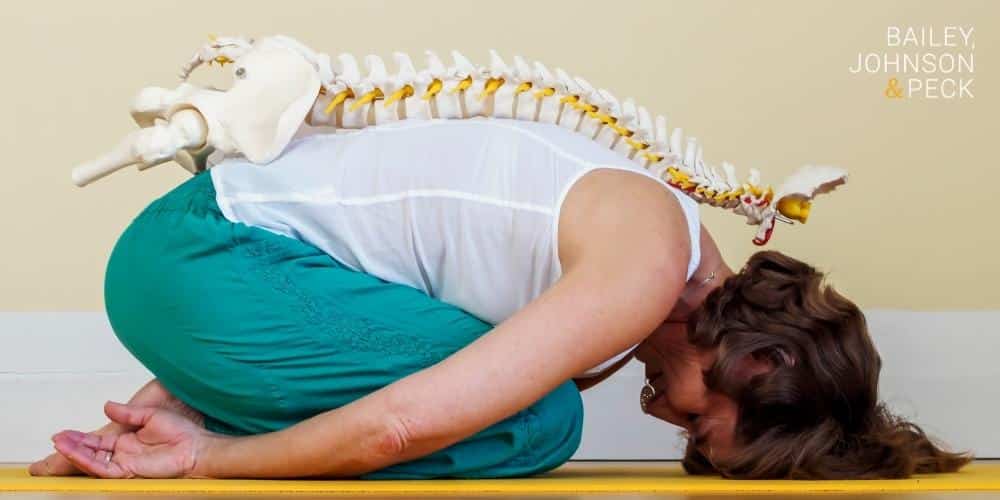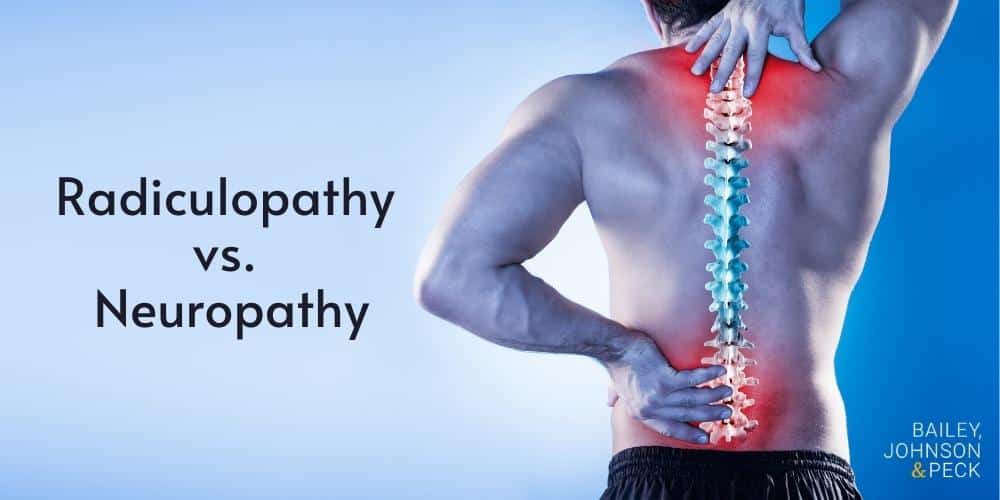The human body is basically just a big, complex bundle of nerves. Any type of spinal injury can easily cause damage to the nerves and lead to a wide variety of debilitating symptoms. As a result, you may have thousands of dollars in medical bills, physical therapy bills, and lost wages to worry about. Two types of nerve disorders – radiculopathy vs. neuropathy – tend to share a lot of the same symptoms, so it’s difficult to know which disorder you could be suffering from. Below, the Albany personal injury lawyers at Bailey, Johnson & Peck break down the symptoms, causes, and treatments of both of these conditions.
If you suffered a back injury, a spinal injury, or nerve damage in a major accident (such as a car accident or a slip and fall accident), you may have grounds to pursue financial compensation through a personal injury lawsuit. Call 518-456-0082 to schedule a free consultation with our Albany back injury lawyers.
What is Radiculopathy?
Radiculopathy occurs when a compressed nerve root in your spine causes a variety of symptoms such as pain, tingling, numbness, and more. The location of the pinched nerve in the spinal column generally determines what type of radiculopathy you have.
Types of Radiculopathy
There are three main types of radiculopathy: cervical, thoracic, and lumbar radiculopathy. A radiculopathy diagnosis heavily depends on the location of the affected nerve root. Additionally, symptoms of radiculopathy can vary depending on which type of radiculopathy diagnosis you receive.
- Cervical Radiculopathy: This means that you have compressed nerves in your neck.
- Thoracic Radiculopathy: This means that you have pinched nerve roots in your upper to middle back.
- Lumbar Radiculopathy: Lastly, this type of radiculopathy means that you have a pinched nerve in your lower back.
Is Sciatica a Type of Radiculopathy?
Yes, sciatica is a type of radiculopathy. Sciatica occurs when the sciatic nerve – the longest nerve in the body that runs down the buttocks and the back of each leg – becomes pinched. In other words, sciatica is very similar to lumbar radiculopathy, because the sciatic nerve is a nerve that travels down the lower back. Sciatica sufferers often experience:
- Numbness, tingling, and pain in the back of one thigh
- Buttock pain, numbness, and tingling
Symptoms of Radiculopathy
Common radiculopathy symptoms include:
- Neck pain
- Middle and lower back pain
- Leg pain
- Muscle weakness
- Numbness and tingling in the arms and legs
Again, symptoms will heavily depend on which spinal nerve root is being compressed. For example, if you have cervical radiculopathy, you may have sharp pain in the neck as well as numbness and tingling in the arms, hands, and fingers. Meanwhile, if you have thoracic radiculopathy, you may have upper/middle back pain, shoulder or arm pain, and pain around your chest when you breathe.

Is Radiculopathy Nerve Damage?
Yes, radiculopathy is one of many types of nerve damage. However, this type of nerve damage is generally temporary and reversible, especially with timely medical treatment.
Causes of Radiculopathy
Common causes of radiculopathy include:
- Major Accidents such as car accidents and slip and fall accidents can lead to the compression of a spinal nerve root.
- Chiropractor Malpractice: If a chiropractor pops the head, neck, or spine incorrectly, patients could endure the pain of a pinched nerve. If you have experienced pain, numbness, tingling, or burning in the back or limbs after a chiropractic readjustment, contact an Albany chiropractor malpractice lawyer at our law firm.
- Bone Spurs and Herniated Discs can both press on nearby nerves in the spinal column. These conditions are the most common causes of radiculopathy.
- Ossification of the spinal ligaments – AKA thickening of the spinal ligaments – can also cause radiculopathy. When spinal ligaments thicken, there is less space around the surrounding nerves. Therefore, many nerve roots get pinched.
The most uncommon causes of radiculopathy include spinal infections, spinal stenosis, and cancerous growths. Our Albany car accidents lawyers and our Albany slip and fall accident lawyers can help.
Radiculopathy Treatments
In most cases, radiculopathy requires little to no treatment. Your doctor may recommend:
- Ice or Heat Therapy to reduce pain in the affected area.
- Nonsteroidal Anti-Inflammatory Drugs (NSAIDs) for pain management.
- Corticosteroids to reduce pain and inflammation.
- Physical Therapy and/or Yoga Poses, which may relieve pressure on the spinal nerve roots.
- Improving Your Posture: Most of us sit hunched over at a desk all day long. Over time, this can cause serious pain from compressed root nerves. Sitting up straighter at your desk may gradually reduce this pain. Additionally, standing desks can help people whose radicular pain is caused by sitting in a hunched over position.
What is Neuropathy?
Neuropathy is one of several nervous system disorders out there. This condition is basically damage to the nerves that are outside of the brain and spinal cord – AKA the peripheral nerves. In other words, neuropathy is a type of peripheral nervous system dysfunction.
Your central nervous system is your brain and spinal cord. If you have a traumatic brain injury or a spinal cord injury, then you have central nervous system damage. Your peripheral nervous system, on the other hand, includes all the nerves outside of the brain and spinal cord. In fact, these nerves communicate information to your brain so that you can move and feel.
The peripheral nervous system is made up of the autonomic nervous system (ANS) and the somatic nervous system (SNS). Three types of peripheral nerves make up the ANS and the SNS:
- Sensory Nerves allow you to feel pain, temperature, and other sensations.
- Autonomic Nerves: These are the nerves controlling unconscious functions such as digestion, heart rate, digestion, and more.
- Motor Nerves allow you to move your arms, legs, fingers, toes, and other body parts.
So peripheral neuropathy occurs when a peripheral nerve becomes damaged in some way. This nerve damage can cause very similar symptoms as radiculopathy.
To learn more, contact an Albany TBI lawyer or an Albany spinal cord injury lawyer at our firm.
Types of Neuropathy
Common types of peripheral neuropathy include:
- Cranial Neuropathy: There are twelve cranial nerves in the body that exit directly from the brain. If one or more of these cranial nerves is damaged and causing pain, then a patient will be diagnosed with cranial neuropathy. One of the twelve cranial nerves is the optic nerve. If this nerve sustains damage, then a patient will likely receive a diagnosis of optic neuropathy.
- Focal Neuropathy occurs when only one nerve is damaged. For example, many people suffer from focal neuropathy in the hand, leg, head, or torso.
- Diabetic Neuropathy occurs when diabetes has damaged multiple peripheral nerves.
- Autonomic Neuropathy occurs when the autonomic nerves are damaged. Autonomic nerve neuropathy may result in health issues with the heart, GI tract, urinary system, etc.
- Motor Neuropathy occurs when one or more of the motor nerves is damaged. Sufferers may struggle with mobility issues.
Neuropathy Symptoms
All the types of neuropathy generally come with a different set of symptoms. Common symptoms include:
- Numbness, tingling, and a pins and needles sensation in the different parts of the body
- Sharp, throbbing, or burning pain
- Muscle weakness
- Loss of coordination
- Emotional disturbances
- Difficulty sleeping
- Loss of bowel or bladder control
- Sexual dysfunction
- Excessive sweating or no sweating
- Issues with blood pressure
- Trouble eating and swallowing
- Muscle twitching and spasms
- Abnormal heart rate
- Dizziness and lightheadedness
- Difficulty moving parts of the body
- Changes in sensation (temperature, pressure, pain, etc.)
- Unintentional weight loss
- Loss of muscle control
- Loss of muscle tone

Causes of Neuropathy
Neuropathy is caused by a wide variety of things such as major accidents, medication errors, health conditions, poisonings, and more. The most common causes of this condition are listed below.
- Motor vehicle accident such as car accidents, semi-truck accidents, pedestrian accidents, bicycle accidents, and motorcycle accidents
- Slip and fall accidents
- Sports accidents
- Medical malpractice incidents
- Long-term alcoholism
- Diabetes
- Autoimmune disorders such as lupus, rheumatoid arthritis, Sjogren’s syndrome, and Guillain-Barre syndrome
- Infections such as HIV, herpes, syphilis, Lyme disease, leprosy, Epstein-Barr virus, chickenpox, shingles, etc.
- Long-term exposure to lead and mercury
- Vascular disorders
- Cancerous or benign tumors, which may compress nerves
Neuropathy Treatments
Neuropathy treatment heavily depends on the type of neuropathy a person has been diagnosed with. Common treatment options include:
- Medications to reduce pain
- Physical therapy to improve mobility, muscle control, and muscle tone
- Mechanical aids, such as wheelchairs, braces, canes, and specially designed shoes to help mobility
- Proper nutrition to support healthy nerve function
- Healthy habits such as maintaining a healthy weight as well as avoiding alcohol and smoking
- Transcutaneous electrical nerve stimulation (TENS)
- Surgery to remove tumors or improve entrapment neuropathy such as carpal tunnel syndrome
Radiculopathy vs. Neuropathy
So back to the main question at hand – radiculopathy vs. neuropathy. What’s the difference?
The symptoms of radiculopathy and peripheral neuropathy overlap quite a bit. But the main difference is that radiculopathy is caused by compression of spinal nerve roots, and neuropathy is not. Neuropathy is peripheral nervous system dysfunction, meaning the peripheral nerves are being damaged by trauma, health conditions, poisonings, etc.
In both radiculopathy and neuropathy, the affected nerves will lead to a wide variety of different symptoms.

Call Albany Personal Injury Lawyers at Bailey, Johnson & Peck Today
If you suffered radiculopathy or neuropathy from a major accident, you may have grounds to file a personal injury lawsuit against the negligent party. The Albany personal injury lawyers at Bailey, Johnson & Peck will listen to your story and help you determine the best course of action to recover compensation for your damages. Call 518-456-0082 to schedule a free consultation with our legal team today.




